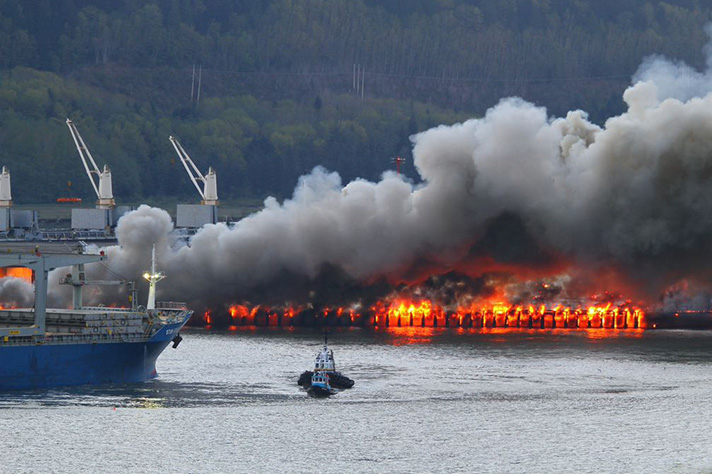Accidents happen. Is Woodfibre LNG worth the risk?
April 23, 2015
Tracey Saxby

The environmental tragedies of the last two weeks have made one thing clear: accidents happen.
On Wednesday 8th April, ~2,800 litres of toxic bunker fuel was spilled in English Bay, and the black tar-like sludge has been washing up on Vancouver's beaches. A little over a week later a dock fire at Squamish Terminals blazed out of control, with toxic smoke from the burning creosote pilings lingering over town.
The details of the emergency response for these two accidents show that the Provincial and Federal governments don’t have the capacity to deal with these kinds of accidents. Even Premier Christy Clark admitted: "We don't have world class spill response on our coast."
In English Bay, the emergency response was delayed by several hours because the Harper Conservatives closed the Kitsilano Coast Guard station in 2013, turning this relatively small spill into a major tragedy. Responders from the Kitsilano Coast Guard could have been on site with the right equipment in 6 minutes, preventing a costly cleanup of Vancouver’s beaches.
To add salt to the wound, the company contracted to clean up the mess in English Bay is more than 50% owned by Kinder Morgan. This for-profit company has the capacity to profit from any oil spill, which is a huge conflict of interest. The bigger the spill, the bigger the bill.
In Squamish, the Coast Guard response was much quicker, potentially because of the political backlash the previous week; however the emergency response was still heavily reliant on volunteer firefighters fighting alongside career firefighters from Squamish, Whistler, and the City of Vancouver – who all worked around the clock and did a tremendous job despite limited capacity.
How does this relate to Woodfibre LNG? Government cuts have created a situation where regulators do not have sufficient staff, knowledge, or money to effectively regulate the oil and gas industry, leaving industry to monitor itself. Remember Lac Megantic? What about the Mt Polley tailings pond spill? These accidents were never meant to happen.
Negligent government oversight and a self-regulating industry, combined with a lack of emergency response capacity can only mean that we will see more incidents like this in the future.
Woodfibre LNG and its associated tankers, pipelines, and compressor stations pose an unacceptable safety risk for people in Squamish and other communities along the shores of Howe Sound. We need to stand up and say enough is enough.